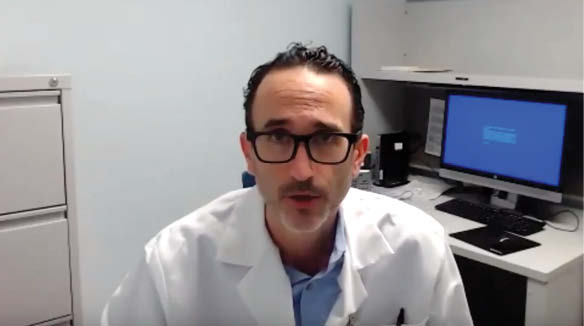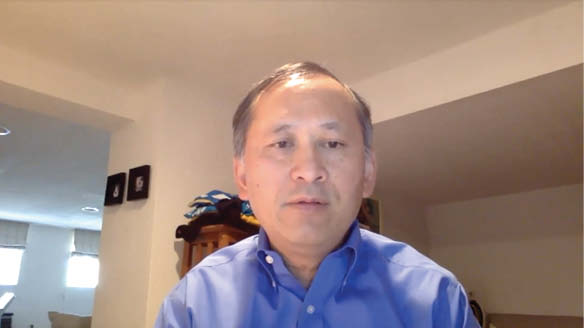ETHNIC MEDIA SERVICES BRIEFING
Ethnic Media Services press conference last week public health officials, frontline health care providers, legal experts & advocates will address issues around the coronavirus and how it affects ethnic and immigrant communities.
One of the people on the panel was Dr. Tung Nguyen, physician and researcher at UCSF University of California, San Francisco Asian American Health Research Center . He explained that the “virus is an infectious organism. COVID-19 is a Coronavirus which is a large family of viruses that causes respiratory infection. It is a new infection and we don’t know how the body responds to it. The research community is mounting a rapid response so we will be learning more in the next few weeks.”
He stated that there is no vaccine for COVID-19. There is one that has approved and started in Phase 1 but will take 12-18 months before we can get to an effective vaccine.
In a widespread emergency with an emerging threat there is a lot there is unknown and minorities communities due to lack of access to information in their own languages and the reliance on social media for information are in particular at high risk for bad information. Dr. Nguyen said, “In this particular pandemic, bad information can be deadly.” He also mentioned that the information changes everyday .
“You need to just stay home,” Nguyen stressed. The most effective methods to steer clear of the virus are social isolation and avoiding touching objects and surfaces. For communities of color and immigrants, who tend to live in multigenerational households, he said that it’s imperative that people who must leave the household for work wash up and change clothes afterward, before engaging with their families again.
“The virus may be in the air for up to three hours. It can live on cardboard for up to 24 hours and on plastic and steel for 72 hours”, the UCSF physician said.
TESTING
There is a shortage of testing kits and we need to keep them for people who exhibit symptoms.
The best way to get tested is to contact your doctor, hospital, or department of public health to see where the testing sites are.
“Please don’t overwhelm the health care system by contacting them for questions and testing if you don’t have symptoms,” Dr. Nguyen said.
Findcovidtesting.com if you want information on testing (these are works in progress).
WHAT TO DO IF YOU THINK YOU HAVE IT
“Most people recover from infection without any treatment. One out of six get seriously sick.
The most common symptoms are fever, tiredness and dry cough, and maybe body aches. These are not that different from the common cold.
“Most people don’t have any symptoms and can be giving it to other people. It’s important to stay at home.
“If your symptoms last for more than seven days, call your healthcare provider.”
“If you feel ill what do I do if I get sick? Then call ahead. Plan ahead. Call the hospital. If your insurance has a telehealth option, use that,” Dr. Nguyen said.
PREVENTION
Many of us live with our parents in confined spaces. How can we prevent the spreading of this?
Dr. Nguyen suggests, “If you have multiple rooms in the house then have a decontamination room. Change your clothes and wash your hands. If you have symptoms wear a mask. If you share a room, then try to do this outside.”
“New York City is currently experiencing the worst of the pandemic,” Dr. Daniel Tuner-Lloveras, UCLA Public Health Department, said. “It’s overloaded hospitals lack medical supplies to treat all ill patients. California hospitals, which had an extra week to prepare, may be better-equipped to manage the surge. They are trying to triage appropriately, using telemedicine and other resources to avoid a crush of people coming in at once.”
Turner-Lloveras has worked in low-income communities in Los Angeles and advocates for hospitals to be “ICE-free zones” that limit immigration agents’ access so they cannot arrest and detain people seeking medical care. He also spoke out against the overcrowding at ICE detention centers that can increase the community spread of the virus.
“I would really emphasize staying home. The key way to stop the spread of this pandemic is isolation.
“People ask how they can help out and I would say first and foremost would be to stay home. It sounds very simple. It stops the spread of it.”
Dr. Rishi Manchanda, public health innovator and founder of Health Begins has also worked in South Central Los Angeles’ low-income communities. He told reporters that pandemic disproportionately affects the economic communities, well-being of people of color and the immigrant community as well as their health.
Dr. Manchanda also has worked in South Central Los Angeles’ low-income communities. He told reporters that the pandemic disproportionately affects the economic well-being of people of color and the immigrant community as well as their health.
“It’s hard to not work for many communities of color. Lower wages and insufficient insurance coverage limits their access to treatment and often forces them to work even while ill, increasing the risk of exposure to the community,” he said. Also, many minorities live in large cities, frequently in public housing, placing them at a greater risk for infection. And members of ethnic communities often work in front-facing jobs, such as grocery-store clerks, and take public transportation to get to jobs, resulting in higher rates of exposure.
Dr. Manchanda added that limited access to testing, language barriers, and underlying illnesses, such as diabetes and heart disease that disproportionately affect certain minorities, put immigrants and minorities at greater risk of infection and death.
Dr. Manchanda also recommended that people of color be careful when taking medications to treat the virus and to listen to doctors so they don’t risk overmedicating.
MENTAL HEALTH AND SUBSTANCE ABUSE
Dr. Sampat Shivangi, psychiatrist on the Trump Administration’s panel on mental health and substance abuse also spoke on the panel. He talked about how substance abuse and how lack of connections can cause loneliness and social isolation can be as twice as harmful to mental health as obesity. It can also lead to acute stress disorder.
“This is not to suggest that quarantine should not be used as the spread of infection might get worse,” Dr. Shivangi said. “But it needs to be handled carefully.”

Dr. Turner-Lloveras (above) is an assistant Professor of Medicine at Harbor-UCLA/David Geffen School of Medicine at the University of California Los Angeles at Harbor-UCLA.

Dr. Tung Nguyen, physician and researcher at UCSF University of California, San Francisco Asian American Health Research Center

